Episodes
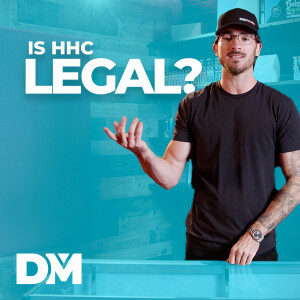
Thursday Apr 04, 2024
Thursday Apr 04, 2024
Yes, HHC is (sometimes) Legal..
But that depends on where you live. Here in the US (and in a number of other countries), HHC (hexahydrocannabinnol) became federally legal in 2018 as a result of the 2018 Farm Bill. This bill included provisions for clarifying the differences between Cannabis and Hemp, and essentially states that any Cannabis Sativa plant or end product containing less than 0.3% Delta 9 THC would now be considered federally compliant Hemp.
These legal changes drastically altered the Hemp farming industry, and ultimately resulted in mass quantities of CBD being put into the market. Labs would later learn how to convert CBD into several additional psychoactive and non-psychoactive compounds like Delta 8 THC, HHC, CBN and CBG. When placed into vapes, cartridges or edibles, these hemp derived cannabinoids can produce similar effects to the federally regulated Delta 9 THC, all while containing little to no Delta 9.
As these products became more popular and more widely available, many individual state governments have passed legislation banning or regulating the use and sale of this class of compounds. Some have banned specific examples, and others have clarified the state’s position that these products are federally legal.
Is HHC Synthetic?
That depends on who you ask. There are a number of instances where HHC has been documented to be naturally occurring. In other words, researchers have harvested naturally grown Cannabis and have found HHC existing within the plant matter.
However, in order to produce HHC at the scale required for production of consumer goods, it must be derived through a conversion process which takes CBD extracted from Hemp and turns it into high purity HHC.
Where Can I Buy HHC?
In states where HHC is legal, you are likely to find HHC at smoke shops, convenience stores, and maybe even gas stations, especially in areas where traditional cannabis access is restricted. There are also countless online retailers who will be happy to sell you an HHC product and then ship it to you. In just about every case, you’ll have to be at least 21 years of age. Because the legality varies so widely, it’s important to check with the regulations in your state before making a purchase.
🛒 Shop our Products: https://distromike.com/
become an affiliate: https://linkin.bio/shop_distromike
🔔 Subscribe for more educational content. Hit that bell icon to stay updated on the latest in everything CBD, vape, and more and join our growing community of vape enthusiasts. 💨✨
❤️ Thank you for your support! Don't forget to like, share, and comment below. Your feedback fuels our creativity. Until next time, happy vaping! 🌬️🎉
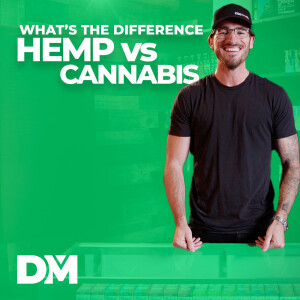
Thursday Apr 04, 2024
Thursday Apr 04, 2024
Hemp and Cannabis in Nature
When growing naturally, there is no true difference between Hemp and Cannabis. Both of these words describe a species of plants that fall into the classification of Cannabis sativa. While it’s true that today, hemp and cannabis are cultivated for different reasons, it is simply a result of legal classification that we have the two separate words to begin with. The only certain difference between the two based on today’s legal standards is that hemp contains less than 0.3% Delta 9 THC, and Cannabis contains more than 0.3% Delta 9 THC.
The Legal Definition of Hemp vs Cannabis
In 2018 the US Federal Government passed the current version of The Farm Bill, which is a set of laws and regulations covering a wide array of topics related to agriculture and the trade of agricultural goods both domestically and internationally. While this is something traditionally done every 5 years, what made 2018 different was that this version of the Farm Bill contained a provision that legally defined Hemp. As this definition states, any cannabis product containing less than 0.3% Delta 9 THC would be classified as a federally legal hemp product and that it would not be subject to traditional cannabis laws and regulations. This created a legal framework for hemp farmers to operate within the US to produce hemp goods as well as CBD and other minor cannabinoid products.
The Farm Bill Loophole
Since this definition was established in 2018, a lot has changed within the hemp industry. While many would argue that this legal definition was reached in order to provide wider access to CBD and hemp textile production, it has also allowed for the legal production and sale of psychoactive hemp derivatives such as Delta 8 THC and HHC, which are converted from legal CBD and do not contain more than 0.3% Delta 9 THC. There are a number of additional minor cannabinoids involved in this conversation such as CBN and CBG, and the topic is heavily debated and legislated upon on a fairly ongoing basis.
Cultivating Hemp and Cannabis
As it stands, cultivation of these two legally defined plants happens for separate reasons. Cannabis is produced almost entirely for human consumption. These plants are bred for high THC content and are almost always meant to be enjoyed by smoking or vaporizing, or perhaps turned into concentrated oils or edible products.
Alternatively, Hemp is cultivated widely for use in textiles and building materials, and of course for the extraction of large quantities of CBD. With the CBD extracted, it can be used in a variety of consumable and topical CBD products. This CBD can also be further converted into a long list of minor cannabinoids like Delta 8 THC and HHC, which are often used to make federally compliant edible and vape products that offer similar experiences to traditional cannabis products.
🛒 Shop our Products: https://distromike.com/
become an affiliate: https://linkin.bio/shop_distromike
🔔 Subscribe for more educational content. Hit that bell icon to stay updated on the latest in everything CBD, vape, and more and join our growing community of vape enthusiasts. 💨✨
❤️ Thank you for your support! Don't forget to like, share, and comment below. Your feedback fuels our creativity. Until next time, happy vaping! 🌬️🎉
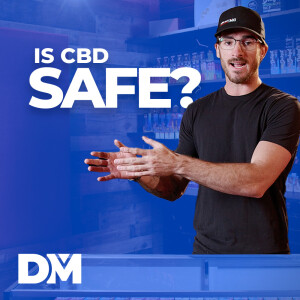
Thursday Apr 04, 2024
Thursday Apr 04, 2024
Is CBD Safe?
Yes, CBD is generally considered to be safe to consume. CBD is a non-psychoactive cannabinoid, meaning regardless of the amount consumed, a user won’t get “high” or intoxicated. However, it’s important to be sure you are consuming products with high levels of quality control.
What’s In Your CBD?
Years ago, when users first started seeing CBD products hit the market, there was little to no regulation or quality control. Many products would have labels showing extremely high levels of CBD content, and then later lab testing would prove that the products didn’t actually contain any CBD at all.
Today, the CBD market is quite a bit different. The overall number of smaller manufacturers or brands have left the space, and the vast majority of companies making CBD products today are legitimate, meaning they adhere to quality control measures in production and they implement lab testing on their products. Lab testing is vital to ensure you are consuming a quality product.
Quality products should offer codes or links to Lab Testing results showing what a particular product contains in terms of ingredients, but also ensuring that the product is free from a long list of potentially harmful contaminants such as heavy metals, residual solvents, pesticides, molds, or microbials. For the most part, CBD products sold by reputable retailers today are safe.
CBD Side Effects
CBD (cannabidiol) is generally well-tolerated by most people, but there have been reports of some common and mild side effects:
Dry mouth - which is often mild and can be alleviated by staying hydrated.
Drowsiness - Especially at higher doses, and more common when taken alongside other medications that cause drowsiness.
Changes in appetite - CBD could increase or decrease the appetite of different users
Digestive issues - like nausea or cramping may be experienced at high doses
Interactions with medications - CBD may adversely affect metabolism of certain medications, especially those metabolized by the liver.
Other side effects - like lightheadedness, low blood pressure, or allergic reactions are rare but possible
How much CBD should I take?
While cannabinoids affect each individual differently, most users report effective doses of CBD between 150 and 300 mg per day. The effects of CBD are sometimes cumulative in the sense that you may need to consume CBD daily for an extended period of time before noticing results. New users who are not experienced with cannabinoids may consider starting with 50 or 100 mg daily to gauge tolerance before consuming more.
🛒 Shop our Products: https://distromike.com/
become an affiliate: https://linkin.bio/shop_distromike
🔔 Subscribe for more educational content. Hit that bell icon to stay updated on the latest in everything CBD, vape, and more and join our growing community of vape enthusiasts. 💨✨
❤️ Thank you for your support! Don't forget to like, share, and comment below. Your feedback fuels our creativity. Until next time, happy vaping! 🌬️🎉
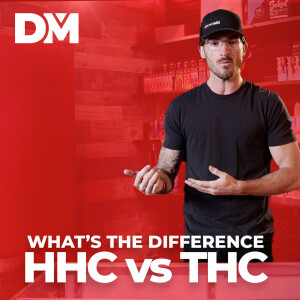
Thursday Apr 04, 2024
Thursday Apr 04, 2024
Practically Speaking…
In a practical sense, there isn’t that much that truly separates HHC (hexahydrocannabinol) from THC (tetrahydrocannabinol). Both of these are psychoactive cannabis compounds, meaning you will find both of them in naturally occurring cannabis, and both of them will provide users with an uplifting experience, more commonly referred to as a “high”.
When vaped, HHC provides a strong head high that often still allows the user to focus or concentrate, and it often doesn’t create unwanted feelings of anxiety or paranoia. These qualities make it a great choice for all-day use. THC is typically associated with a more intense and comprehensive body-high in addition to being either uplifting or sedative, depending on the strain of THC cannabis that is being consumed.
The Science
If you want to get really technical, the main difference between THC and HHC is that a THC molecule includes a pentyl side chain attached to a dibenzopyran ring. On the other hand, HHC contains a cyclohexyl side chain in this same location, differentiating the molecules from a scientific and legal standpoint. More simply stated, HHC is a hydrogenated form of THC.
From a Legal Perspective
The tiny molecular differences create large implications for the legality of these compounds. THC (or more specifically Delta 9 THC) is usually found in traditional cannabis flower and concentrate products. This compound is heavily regulated in the US and is considered a controlled substance in many states. Some states do have systems for medical patients to access THC cannabis, and a growing number have given up completely on adult-use restriction and have chosen to adopt a recreational cannabis model with dispensaries accessible to anyone 21 and up.
HHC (and every other hemp-derived cannabinoid) was made legal with the passing of the 2018 Farm Bill, which essentially established that any cannabis product containing less than 0.3% Delta 9 THC would fall into the “Hemp” category. Since quality HHC products don’t contain measurable amounts of THC, they are considered federally legal and are only restricted in states that have placed bans on these specific molecules.
Where do I buy HHC vs THC?
There’s a big difference when it comes to buying HHC vs THC products.
THC products are federally regulated. This means that unless a state has established a system for access, THC is illegal. With that being said, a large percentage of the US now offers some form of access to THC, whether it be sold in medical settings or in recreational dispensaries. In any case, there are specific places to purchase THC products in any area.
In markets where THC is heavily restricted or less accessible, you may find a large number of smoke shops and convenience stores selling hemp-derived cannabinoids like Delta 8 and HHC. Because these products are federally legal, they do not require special licensing to buy or sell, and in many cases you can even purchase them online.
🛒 Shop our Products: https://distromike.com/
become an affiliate: https://linkin.bio/shop_distromike
🔔 Subscribe for more educational content. Hit that bell icon to stay updated on the latest in everything CBD, vape, and more and join our growing community of vape enthusiasts. 💨✨
❤️ Thank you for your support! Don't forget to like, share, and comment below. Your feedback fuels our creativity. Until next time, happy vaping! 🌬️🎉
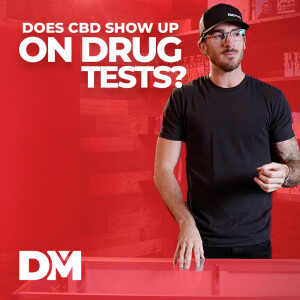
Thursday Apr 04, 2024
Thursday Apr 04, 2024
Not all CBD is Created Equally
Before exploring more about whether or not CBD can cause a positive result for Cannabis on a drug test or screening, it’s important to understand the key differences between the different types of CBD products available in the consumer marketplace.
CBD Isolate - CBD isolated as a single cannabinoid.
Broad Spectrum CBD - CBD containing several minor cannabinoids but “Zero” THC.
Full Spectrum CBD - CBD Containing minor cannabinoids including small amounts of Delta 9 THC, but still less then the 0.3% legal limit.
What does this mean for Drug Testing?
In theory, the type of CBD you consume should determine how that use would reflect on a drug test. Consuming CBD Isolate or Broad Spectrum CBD should only be exposing you to virtually undetectable levels of THC, which one would assume would result in clear drug testing results for Cannabis or THC. While Full Spectrum CBD contains very little CBD, it does contain SOME, which could have the potential to raise a red flag during a screening.
Lab Variables
The truth is that the variables at play start long before you show up to your drug test. There exists a potential for variances between labs during the original product testing process. This means that depending on the calibrations of the equipment used, different labs may show different amounts of THC or other cannabinoids present. Testing methods also typically rely on LOD’s (limits of detection) set up within the test, meaning some labs may show small amounts of cannabinoids present, while others may show a flat zero. Any reputable labs will show results fairly close to one another, but the potential for a small margin may be worth considering.
Types of Drug Tests
There are numerous methods of drug testing or drug screening, all used for different purposes. Many of these tests are not actually looking for THC, but rather the metabolites produced during the human processing of THC. Because of the wide array of testing methods and thresholds, it’s absolutely crucial that you weigh the pros and cons of your own situation. While we can make assumptions, we simply do not know enough about the types of drug tests being used or how these different cannabinoids are metabolized in relation to a specific testing type.
What’s the Verdict?
When it comes down to it, we simply suggest not to risk it. While you could be in the clear consuming CBD isolate or Broad Spectrum CBD products and then taking a drug test, those trace amounts of THC could potentially show up on a sensitive test. With a Full-Spectrum CBD product, you are consuming measurable amounts of THC, but still maybe not enough to change a test result. Because of this level of uncertainty, we recommend that if you are subject to drug testing, especially if those tests determine your eligibility for employment, athletics, or legal status, that you make serious considerations before putting cannabinoids into your body.
🛒 Shop our Products: https://distromike.com/
become an affiliate:https://linkin.bio/shop_distromike
🔔 Subscribe for more educational content. Hit that bell icon to stay updated on the latest in everything CBD, vape, and more and join our growing community of vape enthusiasts. 💨✨
❤️ Thank you for your support! Don't forget to like, share, and comment below. Your feedback fuels our creativity. Until next time, happy vaping! 🌬️🎉
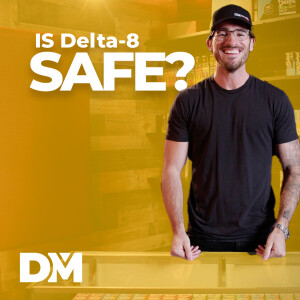
Thursday Apr 04, 2024
Thursday Apr 04, 2024
The Short Answer
In most cases, yes, Delta 8 THC is relatively safe. This cannabinoid has been consumed for several years now without any concrete indications that the molecule itself raises any specific concerns for user safety. Generally speaking, Delta 8 offers the same effects as traditional Delta 9 Cannabis, and usually causes less overwhelming feelings of anxiety or paranoia.
What’s in your Delta 8?
The primary considerations for Delta 8 safety come from a quality perspective. When looking at the industry as a whole, (especially a few years back when it was just getting started) it’s important to be aware that not all producers of raw Delta 8 distillate or finished Delta 8 goods follow the same guidelines.
An intricate process and facility is required to safely convert CBD into Delta 8 THC. If done incorrectly, the end product has the potential to contain pesticides or mold from the hemp cultivation, residual solvents or heavy metals leftover from the conversion, or any number of other contaminants. This is why it’s extremely important to purchase your Delta 8 products from a trusted source, and always check a product’s lab test results for an added level of security.
It’s also worth noting that a manufacturer could, in theory, send extremely high quality oils to a lab to obtain test results, and then end up putting something completely different in the actual product. This makes it even more important to know the facts about the brands you choose to consume.
Delta 8 Edibles
The dangers associated with Delta 8 edibles include low quality products, but more often have to do with incorrect dosing. Many first time edible consumers end up starting with a reasonable dose, and then when they don’t feel the effects, they double or triple down. This is usually just a few moments before the original dose starts to kick in, with two more doses being metabolized within the digestive system. This can lead to a new user feeling far too high, anxious, intoxicated or paranoid, and typically does not lead to an overall positive experience. Our advice is to take your time, start with a single dose, and then wait a full 2 hours before considering more. Once you're comfortable with how your body reacts, you’ll know more about the dosages that are best for you.
Vaping Vs Smoking
Generally speaking, inhaling anything has the potential to cause some type of damage to the respiratory system. However, when comparing smoking to vaping, it’s clear that vaping is a far healthier choice. The combustion of plant matter creates byproducts that are known to have the potential to be harmful, and vaping at low temperature avoids this combustion process. When inhaling, a high quality vapor product should be far smoother than any inhaled smoke. If that’s not the case, consider the source and quality of your vaping products.
🛒 Shop our Products: https://distromike.com/
become an affiliate: https://linkin.bio/shop_distromike
🔔 Subscribe for more educational content. Hit that bell icon to stay updated on the latest in everything CBD, vape, and more and join our growing community of vape enthusiasts. 💨✨
❤️ Thank you for your support! Don't forget to like, share, and comment below. Your feedback fuels our creativity. Until next time, happy vaping! 🌬️🎉

Thursday Apr 04, 2024
Thursday Apr 04, 2024
✈️ Can you bring a vape through TSA?
As of the time of this writing, you most definitely can fly with a vape. These days, millions of travelers are boarding airplanes in the US after going through TSA checkpoints, and a very large number of those people are carrying a vape.
TSA actually lays out the rules pretty clearly. If you’d like to bring a vape on board, it must be stored on your person or in your carry-on luggage. Just like other electronics with batteries, airline officials require that these types of devices stay within the pressurized passenger cabin. One could assume that drastic changes in temperature or pressure could cause a malfunction with the battery or wiring, leading to a much bigger problem for everyone on board. So, in the name of safety, your vape needs to go in your pocket, handbag, or carry on bag. It’s that simple.
Ask us how we know…
Not only did we refer to the official TSA guidelines, but we also know because we actually do it, ALL THE TIME. As members of the vaping industry, we travel by air while carrying vapes of all types literally dozens of times each year.
In fact, we once took a trip while carrying a bag containing nearly 500 vapes. Just like the rest of our carry-on luggage, this bag went through the scanner and came out the other side, all clear.
What about flying with Weed Vapes?
When it comes to flying with Hemp or Cannabis vapes, the rules are a little bit less clear. While it’s unlikely that any vape will cause you an issue while passing through security, if you do happen to get stopped or questioned, and the state you are in or are flying to considers these compounds to be illegal, you could theoretically end up in some trouble. However, many cannabis consumers travel with their herbal stash regularly without issue, and TSA has made statements supporting the idea that they are probably not working to bust you for personal use amounts of substances. Ultimately, that one is your call.
🛒 Shop our Products: https://distromike.com/
become an affiliate: https://linkin.bio/shop_distromike
🔔 Subscribe for more educational content. Hit that bell icon to stay updated on the latest in everything CBD, vape, and more and join our growing community of vape enthusiasts. 💨✨
❤️ Thank you for your support! Don't forget to like, share, and comment below. Your feedback fuels our creativity. Until next time, happy vaping! 🌬️🎉
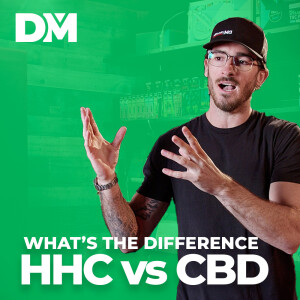
Thursday Apr 04, 2024
Thursday Apr 04, 2024
So, what’s the difference?
In order to talk about the difference between HHC and CBD, we should first highlight the similarities. Both of these compounds are cannabinoids found in the cannabis sativa plant, and both were made legal in 2018 when the Farm Bill classified any cannabis product containing less than 0.3% Delta 9 THC as Hemp rather than federally regulated Cannabis. With that said, there are some fairly diverse applications for each.
CBD stands for Cannabidiol. When consumed by humans, this cannabinoid is non-psychoactive, meaning that it isn’t going to produce any sort of “high” sensation, regardless of how much is consumed. Certain types of CBD products may allow users to feel calm, relaxed, or loose, but not high. For some users, adding CBD to their wellness routine has shown to help alleviate stress and tension, assist with sleeping, and aid in overall health and recovery by lowering inflammation. Although there has been significant study of CBD, the FDA has not approved it, so manufacturers of CBD products still can not produce CBD products marketed to treat any type of illness or condition, and they can even be fined for making health related claims about their CBD products. CBD comes in every form from vape oils and tinctures to edibles and topical creams and can be purchased just about anywhere in the US.
HHC or Hexahydrocannabinol is very different from CBD in the sense that it produces a noticeable and euphoric sensation that can be compared to a traditional cannabis “high’. Most users report a smooth and relaxing head high that doesn’t interfere with their ability to focus, and many consider HHC to be slightly less overwhelming than more conventional Delta 9 THC. There hasn’t been much research in terms of health benefits and HHC, but recreational consumers have adopted HHC use widely, making HHC one of the most popular compounds in states with hemp-derived cannabinoid markets.
Final Take
If you’re looking for something mellow that might help you feel a bit more relaxed at the end of your day without feeling intoxicated or impaired, you may consider trying a CBD product. If your goal is to get baked in an area where traditional cannabis access is restricted, HHC could be the perfect choice for you. Check out CleanAFCBD.com or BakedHHC.com to try some for yourself.
🛒 Shop our Products: https://distromike.com/
become an affiliate: https://linkin.bio/shop_distromike
🔔 Subscribe for more educational content. Hit that bell icon to stay updated on the latest in everything CBD, vape, and more and join our growing community of vape enthusiasts. 💨✨
❤️ Thank you for your support! Don't forget to like, share, and comment below. Your feedback fuels our creativity. Until next time, happy vaping! 🌬️🎉

Thursday Apr 04, 2024
Thursday Apr 04, 2024
The Short Answer
Yes, if you consume Delta 8 THC, there is a high likelihood that you will experience the effects. Whether smoking, vaping, or eating Delta 8 THC products, most users report an uplifting experience similar to traditional Cannabis (usually referred to as Delta 9 THC). All cannabinoids have the potential to produce varying effects between consumers, but generally speaking, consumers choose Delta 8 to experience the “high”.
The Science
Delta-8-THC, a compound in cannabis, does have psychoactive effects which are sometimes compared to delta-9-THC, the main psychoactive compound in cannabis. It interacts with the brain's endocannabinoid system, affecting CB1 receptors. Research shows it can cause euphoria, relaxation, and increased appetite, similar to delta-9-THC but with potentially fewer negative effects like anxiety. However, it still alters cognition and neural activity, resulting in a "high." Its potency varies based on factors like dosage and individual tolerance. While it might offer a more manageable experience for some, responsible use is important. Further research is needed to fully understand its effects and potential benefits.
DistroMike’s Choice
While all cannabis or hemp consumers have different reasons and goals for their consumption, for us personally, we typically stray away from Delta 8 and instead opt for HHC. Some users prefer the overall relaxation that comes with Delta 8, but we prefer the uplifting and energetic type of elevation that we experience from HHC.
TRY OUR DELTA8 OR OUR HHC PRODUCTS AT BAKEDHHC.COM, AND SAVE 20% WHEN YOU USE CODE “DELTA8HIGH’ AT CHECKOUT.
🛒 Shop our Products: https://distromike.com/
become an affiliate: https://linkin.bio/shop_distromike
🔔 Subscribe for more educational content. Hit that bell icon to stay updated on the latest in everything CBD, vape, and more and join our growing community of vape enthusiasts. 💨✨
❤️ Thank you for your support! Don't forget to like, share, and comment below. Your feedback fuels our creativity. Until next time, happy vaping! 🌬️🎉
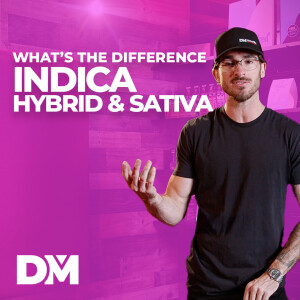
Thursday Apr 04, 2024
Thursday Apr 04, 2024
The Distinction Between Sativa, Hybrid, and Indica
Chances are, if you've spent any time shopping for cannabis products, you've encountered products labeled as Indica, Sativa, or Hybrid, or you've heard these terms thrown around. But what exactly categorizes a product into one of these groups? The answer lies in the terpenes. It doesn’t actually matter how much THC, CBD, or other cannabinoids the buds contain; the real difference between Sativa, Hybrid, and Indica is the terpene makeup.
There are hundreds or perhaps thousands of terpenes responsible for the reactions or effects experienced upon consumption. Some terpenes deliver an uplifting, energizing effect, typically associated with plants labeled as Sativa. On the flip side, others induce feelings of relaxation or drowsiness, often found in plants labeled as Indica. Hybrids typically offer a blend of these effects, creating a more balanced experience.
Busting Myths about Indica, Sativa, and Hybrid Strains
The truth about Cannabis Flower is that there's truly no such thing as a pure indica or pure sativa. Over the last several decades, flower strains have undergone extensive crossbreeding, resulting in almost every strain containing a mix of terpene effects. While certain flowers might lean towards a slightly uplifting or calming effect, there's no solid scientific classification for these strain types.
Origins of the Indica, Sativa, and Hybrid Labels
These labels are essentially a creation of the consumer market. In an ideal scenario, consumers would select strains based on complex terpene profiles. However, the reality is that many consumers lack the knowledge to make informed decisions with this information alone. So, brands and retailers classify strains into these three categories, offering consumers a simplified choice, even if their cannabis experience is limited.
Understanding Strain Types for Cannabis Vapes
When applying these ideas to cannabis vape products, these labels are even more arbitrary. Almost all vapes are made with distillates and flavored with botanical terpenes, with the botanical terpenes being named from existing cannabis flavor profiles that closely match the flavoring. These flavorings are produced from plant elements that do not contain cannabis terpenes, so their effects are usually very similar to one another. The differences in effects may even be attributed to a placebo effect. While this isn’t true 100% of the time, this is a good basis of knowledge when you are purchasing these types of vape products for yourself.
🛒 Shop our Products: https://distromike.com/
become an affiliate: https://linkin.bio/shop_distromike
🔔 Subscribe for more educational content. Hit that bell icon to stay updated on the latest in everything CBD, vape, and more and join our growing community of vape enthusiasts. 💨✨
❤️ Thank you for your support! Don't forget to like, share, and comment below. Your feedback fuels our creativity. Until next time, happy vaping! 🌬️🎉







